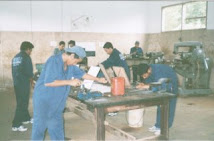Masyarakat Nuklir Indonesia
"Hidup ini adalah pilihan. Aku memilih menjadi orang yang bahagia ….
Aku tahu memang sebuah pilihan yang tidaklah mudah, namun aku harus mulai belajar berani memilih dan memutuskan kemana arah hidupku. Apa pilihan
hidupku? Akulah yang harus menentukan arah jalan hidupku"
Kita Pasti Bisa dan Bahagia!
Indonesian Nuclear Society
The Indonesian Nuclear Society was launched in the mid-1960s,
(when first reactor in Indonesia launched [Triga Mark II at Bandung] a time of growing interest in employing peaceful applications of nuclear science and technology for bettering the lives of people in the Indonesian and around the world.
Visi
Pendukung dan Pengembang Program IPTEK Nuklir untuk Perdamaian di Indonesia
18 Reaktor Nuklir Indonesia tahun 2040
Tersedianya sarana pendamping disetiap reaktor
1. Pusat Pendidikan dan Latihan
2. Pusat Inovasi, Penelitian dan Pengembangan
Misi
1. Wahana Edukasi masyarakat mengenai IPTEK Nuklir
2. Sarana penampung aspirasi masyarakat mengenai IPTEK Nuklir
Program
1. Pertemuan Rutin Pertahun
2. Publikasi dan Edukasi Masyarakat
Fokus
5 Tahun Pertama
(2010-2015)
5 Tahun Kedua
(2015-2020)
5 Tahun Ketiga
(2020-2025)
5 Tahun Keempat
(2025-2030)
5 Tahun Kelima
(2030-2035)
5 Tahun Keenam
(2035-2040)Bagaimana Prinsip Kerja PLTN?
Prinsip kerja PLTN sebenarnya mirip dengan pembangkit listrik lainnya, misalnya Pembangkit Listrik Tenaga Uap (PLTU). Uap bertekanan tinggi pada PLTU digunakan untuk memutar turbin. Tenaga gerak putar turbin ini kemudian diubah menjadi tenaga listrik dalam sebuah generator.
Perbedaan PLTN dengan pembangkit lain terletak pada bahan bakar yang digunakan untuk menghasilkan uap, yaitu Uranium. Reaksi pembelahan (fisi) inti Uranium menghasilkan tenaga panas (termal) dalam jumlah yang sangat besar serta membebaskan 2 sampai 3 buah neutron











